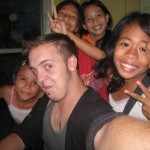
What has been your involvement with Volunteer for the Visayans?
Chris: I first got involved with Volunteer for the Visayans (VFV) in the summer of 2008 as a volunteer. At the time I wanted to take some time out of the fast paced extensive world travel that I and my best friend were doing in order to fully soak up a nation’s culture and to participate in an activity that would allow me to lend a hand to those less fortunate.
After much deliberation I decided to volunteer abroad in the Philippines and joined a project that was helping to develop livelihood skills and enhance academics amongst male youths in conflict with the law. The whole program was fantastic: from my day-to-day volunteer project, to the local community that the volunteers lived in, the local staff and the many different ways you could get involved in extra optional community based volunteering outside of your regular project hours.
By 2009, I already knew how special VFV was and decided to make a return, little realizing that my life would totally change from that decision. After about my first month of volunteering I was fortunate to meet one of VFV’s US co-founders who expressed an interest in putting an expat in the office to help further the organization’s international reputation and to help bridge a few cross cultural issues. I snapped up the chance, little knowing what I was getting myself in for.
Two years on and I’ve just about worked in every aspect of the organization; from ensuring that we’re providing the best possible services to our volunteers, to marketing our program, promoting our Child Sponsorship Program, developing staff skills, communicating with international partners, setting up local community based projects and now helping to extend our operations to a more communities.
It’s been a roller coaster ride and a real learning curve that I’ve thoroughly enjoyed and will never regret doing. As of right now, I am still working on developing VFV’s international recognition as well as helping to develop two satellite programs in other nearby locations in the Philippines.
Approximately how many volunteers do you work with each year?
Chris: We accommodate around 200 volunteers a year from all over the world including high school groups, faculty led groups and private groups.
How do you ensure your programs are sustainable and mutually beneficial for you, the community, and the volunteers?
Chris: We work very closely with local government agencies and communities here in the Philippines to establish and support those projects that are deemed in need of volunteer support. We match volunteers to projects and not projects to volunteers as a means of being responsible and sustainable. Aside from this we also look at long term solutions for our projects: for example, with our Nutrition Public Health project we get volunteers to help with planning and implementing supplementary feeding programs for preschool children whilst at the same time allowing them to work with the local mothers to help promote and educate healthy-eating and good nutrition. Our long term goal is not to feed every single child in the Philippines, but to empower mothers to make the best decisions about their children’s diets.
Our status as a non-profit also means that we channel our entire surplus funding into projects that help empower local communities, families and individuals. Over the years this funding has helped support mass supplementary feeding projects, house building projects, classroom building projects, local community empowerment clubs and of course our Dumpsite Project, but this doesn’t mean we haven’t made mistakes. Rather than directly bowing to the needs of the community we attempt to educate and provide individuals with the skills they need to succeed and excel in life.
Will there ever be a time when the Filipino people don’t need international volunteers? How do we get there?
Chris: I think it’s still a long time off. One in three people in the Philippines lives below the nation’s poverty line and education, public health and social welfare services are still severely under resourced. Any improvement with the Philippines socioeconomic status is going to require some major government reform and some massive cooperation between government and non-government agencies.
Nevertheless, Rome wasn’t built in a day: we’re just trying our best to educate and empower Filipino’s at the smallest community levels, volunteers are a great way to do that. Even if the time came that the Philippines overcame its problem of poverty, I believe that international volunteering and global citizenship is a great way to share ideas and promote development – even developed country’s need volunteers.
Famous last words?
Chris: I’ve been fortunate to live and breathe Volunteer for the Visayans for the last few years and I strongly believe that the organization ticks all of the boxes for a responsible volunteer abroad program. Of course, don’t just take my word for it, check our reviews on GoOverseas.com!